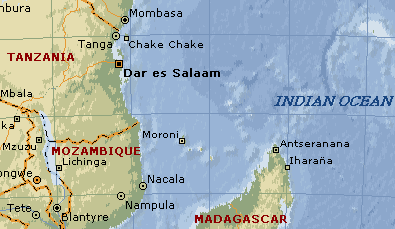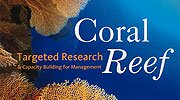|
Eastern Africa:
Institute of Marine Science, University of Dar Es Salaam,
Zanzibar, Tanzania
 Address: Address:
Institute of Marine Sciences
University of Dar Es Salaam
P.O. Box 668 Zanzibar
Tanzania
Ph : +255 24 2230741/2232128
Fax: +255 24 2233050
Websites:
Institute of Marine Science (UDSM)
University of Dar Es Salaam
Western Indian Ocean Marine Science Association
Principal contacts:
COE REP, Director,
Executive Secretary, WIOMSA,
Senior Accountant,
IMS Administrative Officer,
Dean, FASTechnology, University of Dar es Salaam,
Name and affiliation
Institute of Marine Science (IMS), University of Dar Es Salaam, Tanzania jointly with the Western Indian Ocean Marine Science Association (WIOMSA)
Local Area Description
Pending
Regional collaboration
1. Local / regional partners, linkages to non-government organizations (NGO's), government agencies:
IMS has a strong network of partners/collaborators for research and exchange of ideas at national, regional and international levels. This is manifested in several ways such as research collaboration, consultancies, representation in boards etc. The following are examples of such networks.
- IMS works closely with the WIOMSA secretariat, of which the Executive Secretary is a former director of IMS. IMS staff assists the WIOMSA on short term service contracts.
- IMS is represented on the following national boards and committees:
- Board of the Fisheries Dept, Zanzibar
- Board of Trustees of the Mafia Island Marine Park
- National Hydrographic Committee
- Menai Bay Conservation Area
- Misali Island Conservation Area
- Tanzania Coastal Management Partnership
- ANCAP-Tanzania
- IMS is represented and/or represents the Government of Tanzania in various regional and international boards and committees, as follows:
- African Network for Chemical Analysis of Pesticides (ANCAP)
- IOC/UNESCO – Executive Council
- International Oceanographic Data Exchange (IODE)
- Academic Group of Indian Ocean Rim – Association for Regional Cooperation (IOR-ARC; IOR-AG)
- Marine Science and Technology in the Indian Ocean Rim – Association for Regional Cooperation (IOR-ARC: IOR-AG)
2. Regional/ international research partners, networks:
IMS is an active member of Regional and International organizations such as WIOMSA, IOC-UNESCO, UNEP, CORDIO, IUCN, WWF and others.
IMS collaborates with:
- Scientific institutions such as:
- The National Environment Management Council (NEMC)
- Tanzania Fisheries Research Institute (TAFIRI)
- Mbegani Fisheries Development Center (MFDC)
- Government Departments such as:
- Fisheries Departments of both Tanzania Mainland and Zanzibar
- Departments of Environment, Marine Parks and Reserves Unit
- Tanzania Coastal Management Partnership (TCMP), a joint initiative between the National Environment Management Council (NEMC) and the University of Rhode Island/Coastal Resources Center and USAID
- IMS works closely in research and training with University Faculties:
- Faculty of Science (UDSM)
- Faculty of Aquatic Sciences and Technology (FAST)
- Prospective College of Engineering and Technology (pCET-UDSM)
- In the Western Indian Ocean region, IMS works closely with national institutions such as:
- Kenya Marine and Fisheries Research Institute (KMFRI),
- University of Mauritius
- Eduardo Mondlane University (Mozambique)
- University of Cape Town (South Africa)
- South Africa’s Council for Scientific and Industrial Research (CSIR)
3. Collaboration with international research institutions or scientist:
IMS collaborates with several foreign institutions e.g. Israel, Sweden, South Africa, Kenya, Norway, Netherlands, etc. and in particular IMS staff members have collaborative research with scientists/researchers from those institutions. IMS staff also teach in various institutions in the WIO-region.
Collaborative research programs are supported under bilateral and multilateral agreements, e.g:
- Sida-SAREC (through partnership with Stockholm University),
- ODINAFRICA (Ocean Data and Information Network for Africa – IOC/UNESCO)
Other international projects
- GEF projects currently engaged in:
- The African Process for the Development and Protection of the Marine and Coastal Environment in Sub-Saharan Africa, WIOLAB,
- USAID - Tanzania Coastal Management Partnership (TCMP)
- SIDA - Sida-SAREC Marine Science Bilateral Programme, MASMA
- WB - Marine and Coastal Environment Management Project (MACEMP)
- GOOS: GOOS-AFRICA, ODINAFRICA III, IOGOOS
- IOC: IOC Executive Council, Editor of OCEANPORTAL, Member of IODE Committee, National IOC Focal Point, Tanzania National Oceanographic Data Center
4. Student exchange programs
There are a number of formalized student exchange programmes, e.g. Universities of Nijmegen, Netherlands; Aalborg, Denmark
IMS receives many individual foreign students for IMS short courses or doing part of their research towards their masters or doctorate degrees.e.g. countries such as Sweden, Denmark, Norway, UK, Israel, Kenya, Uganda, USA,
Many masters or doctorate students at IMS enrol in exchange programmes, working part time at IMS (especially for field or lab research) and the rest in a foreign institution (currently, mostly in Sweden and the Netherlands).
5. Linking science to management and policy advice
IMS plays a role in policy setting at the National Level.
The Institute has been central in the formulation of various policies related to utilisation, conservation and management of coastal and marine resources, e.g. the Environmental Legislation for Zanzibar and Marine Parks and Reserves Act (1995).
The Institute has co-ordinated and facilitated a variety of local, national and regional workshops, meetings and initiatives aimed at developing and implementing Integrated Coastal Zone Management
6. Linkages to local or regional NGOs, activities/projects with relevance to Coral Reef Targeted Research:
IMS has participated in several national and regional activities/projects that have relevance to the Coral Reef TR project. Examples include:
- Enhanced coral larval settlement and coral transplantation as means of promoting coral replenishment in Tanzania
- Coral reefs play an important role in the socio-economy of the coastal communities in Tanzania. However, the ongoing degradation of coral reefs caused by anthropogenic disturbances and by natural processes threatens the existence and contribution of coral reef ecosystems. In order to contribute knowledge towards sustainable management of coral reefs, investigations were conducted:
- on seasonality in seawater temperature, macro algal abundance and sedimentation rates;
- on coral larval temporal settlement patterns and how settlement could be enhanced using artificial plates and;
- on the survival and growth of transplanted coral fragments from different species on degraded reef habitats and on artificial substrates.
- Monitoring of seawater temperature
- Measuring seawater temperature using StowAway Tidbit Temperature Logger tied on a staghorn coral branch at 3-4m deep, was initiated in September 1996 with technical assistance from Canadian International Development Agency (CIDA) and later (1999-2002) financed by Coral Reef Degradation in the Indian Ocean (CORDIO) project. Currently, the activity is financed by the Institute of Marine Sciences.
- Pollution in coral reefs - Project commenced in 1999 and is ongoing. The project is focused on aspects of biosediment production.
7. Linkages with Coral Reef Targeted Research working groups
Members of Bleaching WG has several years working experience with IMS scientists
|

